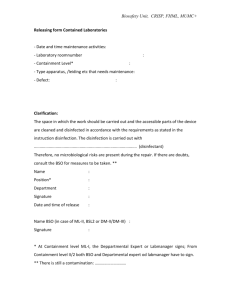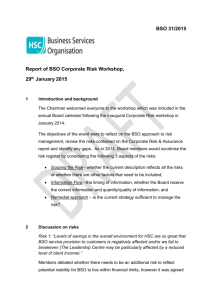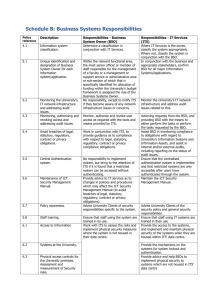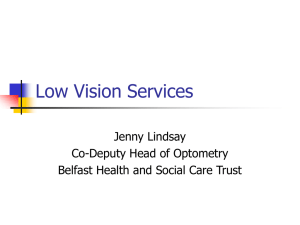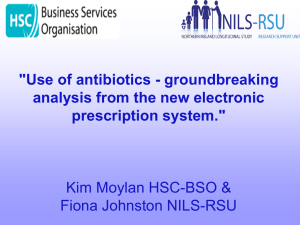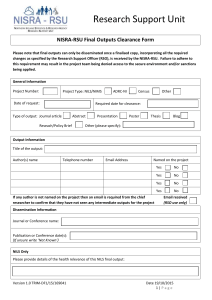ADRC-NI - Business Services Organisation
advertisement
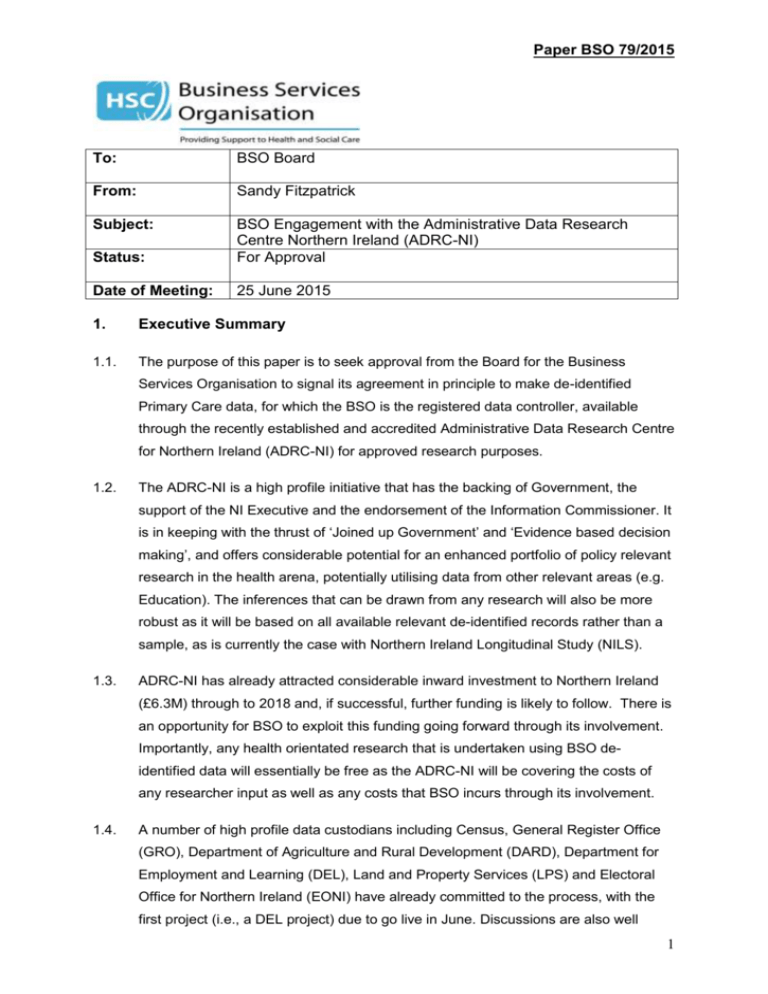
Paper BSO 79/2015 To: BSO Board From: Sandy Fitzpatrick Subject: Status: BSO Engagement with the Administrative Data Research Centre Northern Ireland (ADRC-NI) For Approval Date of Meeting: 25 June 2015 1. Executive Summary 1.1. The purpose of this paper is to seek approval from the Board for the Business Services Organisation to signal its agreement in principle to make de-identified Primary Care data, for which the BSO is the registered data controller, available through the recently established and accredited Administrative Data Research Centre for Northern Ireland (ADRC-NI) for approved research purposes. 1.2. The ADRC-NI is a high profile initiative that has the backing of Government, the support of the NI Executive and the endorsement of the Information Commissioner. It is in keeping with the thrust of ‘Joined up Government’ and ‘Evidence based decision making’, and offers considerable potential for an enhanced portfolio of policy relevant research in the health arena, potentially utilising data from other relevant areas (e.g. Education). The inferences that can be drawn from any research will also be more robust as it will be based on all available relevant de-identified records rather than a sample, as is currently the case with Northern Ireland Longitudinal Study (NILS). 1.3. ADRC-NI has already attracted considerable inward investment to Northern Ireland (£6.3M) through to 2018 and, if successful, further funding is likely to follow. There is an opportunity for BSO to exploit this funding going forward through its involvement. Importantly, any health orientated research that is undertaken using BSO deidentified data will essentially be free as the ADRC-NI will be covering the costs of any researcher input as well as any costs that BSO incurs through its involvement. 1.4. A number of high profile data custodians including Census, General Register Office (GRO), Department of Agriculture and Rural Development (DARD), Department for Employment and Learning (DEL), Land and Property Services (LPS) and Electoral Office for Northern Ireland (EONI) have already committed to the process, with the first project (i.e., a DEL project) due to go live in June. Discussions are also well 1 Paper BSO 79/2015 advanced with Department of Education (DE) and Department for Social Development (DSD) who are also expected to commit. 1.5. It is likely that the ‘on-boarding’ of data custodians will gather momentum fairly rapidly as the Statistics Co-ordinating Group of the NI Civil Service (comprising G5s/ G3s) has now endorsed the initiative and NISRA’s involvement. The group plans to write to the NI Civil Service Board to seek its endorsement for Departmental administrative data to be released for ADRC-NI purposes. 1.6. The legislative cover for the sharing of BSO data for health orientated research is well established through our involvement with the NILS over the past decade. This involvement has been extremely beneficial to both the BSO and the wider Health family, as evidenced by the sample of NILS projects detailed in Annex A. The ADRC-NI initiative will operate along similar lines to NILS but will work across Government more widely. Once the research has been conducted the de-identified data will be securely destroyed. At all times, BSO will remain the Data Controller for BSO data – this will be explicit in all Data Sharing Agreements, which will be developed on a project by project basis. 1.7. BSO will be in control in terms of which research proposals it is prepared to release its de-identified data for, as projects are approved on a project by project basis. The research agenda could, if desired, be heavily influenced from within the Health family who could, if desired, form part of the research team thus having a direct influence on the research. This is the approach that both DEL and DARD have already taken. 1.8. From an Information Assurance perspective, NISRA has a proven track record over the past decade and has all the necessary arrangements in place to preserve the confidentiality of all de-identified data. Their processes and secure environment have been accredited to CESG (the information security arm of GCHQ) standards through the use of an independent government approved security consultant. Importantly, at no time will anyone involved in the ADRC-NI ever see the attribute data relating to named individuals. NISRA has agreed to confirm this in writing and to confirm that they cannot reverse the encryption process and that at no time would they ever seek to do so. All research data are de-identified (i.e. names, addresses, dates of birth are not included) and outputs checked for disclosure prior to release. 1.9. Not engaging with the ADRC-NI could be difficult to justify and defend given the precedent of BSO involvement with NILS and the Statistics Coordinating Group’s endorsement of the initiative. 2 Paper BSO 79/2015 1.10. BSO Chief Legal Advisor has reviewed the ADRC-NI proposal and the Statistics and Registration Service Act 2007 (Disclosure of Patient Registration Information) Regulations (Northern Ireland) 2015, which was passed in May 2015, and is content that DHSSPS and its associated bodies (including the Business Services Organisation – which is named in the regulation) can provide the relevant demographic data they hold to the Statistics Board. This new legislation in conjunction with existing legislation detailed at Annex E provides BSO with the legal basis to engage with ADRC-NI for approved projects. 1.11. BSO currently provides the Honest Broker Service (HBS). This service enables access to linked de-identified data in a secure safe haven for ethically approved research projects. At a high level this is a similar concept to how ADRC-NI will deliver access to linked de-identified data but with one fundamental difference. HBS was setup specifically to enable access to linked de-identified health service data only. The establishment of HBS for this purpose was the outworking of the Memorandum of Understanding signed by all health service organisations. The ADRC-NI will not be restricted to health service data only but will, for approved research, enable access via a secure safe haven environment to linked de-identified administrative data routinely collected by government departments, agencies and other statutory bodies. 2. Recommendation That the Board agrees in principle: i. to support the ADRC-NI initiative by signalling its agreement in principle to share its de-identified data for research purposes; ii. for negotiations to commence on the level of funding that will be provided to BSO for its involvement, which if insufficient will result in the agreement in principle being withdrawn; iii. for the BSO data to be referenced in ADRC-NI data prospectus, in the event that a satisfactory level of funding is agreed. 3 Paper BSO 79/2015 3. Introduction 3.1. The purpose of this paper is to seek approval from the Board for the Business Services Organisation (BSO) to signal its agreement in principle to make de-identified Primary Care data for which the BSO is the data controller available through the recently established and accredited Administrative Data Research Centre for Northern Ireland (ADRC-NI) for research purposes. At the outset, the Board should be aware that BSO will be able to decide, on a project by project basis, if they are content to release their data. Indeed BSO could, if desired, form part of the research team thus having a degree of influence on the research and any findings that emerge. 3.2. The BSO has historically made such data available for research purposes through its involvement with the Northern Ireland Longitudinal Study (NILS), which has provided secure research facilities within NISRA HQ for almost a decade. The sharing of BSO data for research purposes with NISRA has been managed through a Service Level Agreement funded by NISRA. 3.3. Data are clearly the life blood of the ADRC-NI and the Board will appreciate the considerable research potential that the BSO data affords, as evidenced by the variety of NILS Projects (almost 100 in total). Accordingly, strong representation has been made by both NISRA and the Director of the ADRC-NI (Dr Dermot O’Reilly, QUB) to secure access to the BSO data, which is currently shared for NILS, for ADRC-NI purposes. By way of example, Annex A details the more specialised and policy orientated research that has been undertaken to date via NILS. 3.4. Similar to NILS, funding to cover BSO’s engagement with the ADRC-NI will be available and agreed through negotiations with the ADRC-NI team. In line with the arrangements with other data custodians, the level of funding would be discussed in the event that BSO gives its agreement in principle. The funding would cover our involvement in providing our encrypted and de-identified data extracts on a project by project basis, producing metadata and liaising with NISRAs RSU and researchers during the research development phase. 4 Paper BSO 79/2015 4. Background to the ADRC-NI 4.1. NISRA gave an ADRC-NI presentation to members of the Chief Executive and Director of HR and Corporate Services in May 2014. This highlighted that the Administrative Data Research Network (ADRN) is a Government backed initiative which has secured some £35M of ESRC funding across the UK over the five year period ending 2018. It has given rise to the establishment of a dedicated Administrative Data Research Centre in each of the four countries of the UK. QUB, Ulster University and NISRA were awarded the contract to jointly manage the Northern Ireland Administrative Data Research Centre (ADRC-NI), with Dr Dermot O'Reilly (QUB) appointed as director. 4.2. £6.3M of ESRC funding (plus a further £750K from the Public Health Agency Research and Development team to build research capacity) was secured for the Northern Ireland initiative over the same period. NISRA has advised that the Minister for Health, in his previous role as Finance Minister, took a proactive stance in promoting the ADRC-NI among his Executive colleagues and, indeed, participated in the ADRC-NI launch event in December 2014, along with Minister Farry. 4.3. The key thrust of the ADRC-NI initiative is to provide a mechanism for undertaking targeted, and policy relevant, research by facilitating the use, and linkage of, the administrative data routinely collected by government departments, agencies and other statutory bodies. By doing so, the aim is that this will help ensure that the day to day decisions taken, which affect the lives of ordinary people, are firmly anchored on a solid evidence base. NISRA’s specific involvement in the ADRC-NI initiative includes the data acquisition 4.4. through NI departments, agencies and other statutory bodies. In addition, under the management of the Registrar General for Northern Ireland, NISRA has direct responsibility for: i. the provision of the necessary secure infra-structure and secure environment that is utilised to undertake the required data linkage work and facilitate the research; ii. granting access to the secure environment. This requires researchers to have (a) the appropriate security clearance, (b) undertaken the mandatory Safe Research Training and (c) been granted Approved Researcher status. 5 Paper BSO 79/2015 5. Shared vision of ADRC-NI and NILS 5.1. The BSO has been providing administrative data to the Northern Ireland Longitudinal Study (NILS) since 2006. Specifically, this has included the provision of information from the system that BSO use to manage the registration of patients with a GP practice for the purposes of Data Linkage Projects (DLPs), 13 of which have been approved over the past 10 years (see Annex A for further details). Because of its utility for research purposes, the information provided for NILS is now being sought for the ADRC-NI. Other key data suppliers to the NILS include Census Office, General Register Office (vital events) and Land and Property Services, all of whom have signalled their agreement in principle to permit their de-identified data for ADRC-NI research purposes. 5.2. Funding of circa £180K has been provided to BSO over the past 5 years in order to support the NILS work (e.g. providing de-identified data extracts, production and maintenance of metadata, meeting with researchers to assist in the development of research proposals and facilitating the secure encrypted linkage process for DLPs). In addition, the availability of this funding, and the safe research undertaken on the data, has helped to secure real tangible benefits in terms of our internal data infrastructure, analytical capability and overall quality of our data. In a similar vein, additional funding will be available for the BSO to support the ADRC-NI. 5.3. All ADRC-NI research proposals must be approved by a UK-wide approvals panel and must receive ethical approval. The approvals panel requires an assessment from NISRA’s Research Support Unit (RSU) (on behalf of the ADRC-NI leadership team) in terms of the feasibility of the project and any Privacy Impact considerations. Once a project has been approved, NISRA will engage directly with data custodians, who encrypt their data as part of the data linkage process, in order to generate the deidentified data sets that will be merged for research purposes. Importantly, these responsibilities (i.e. by NISRA’s Trusted Third Party (TTP) who have more than a decade’s experience in this important area) are completely separated from those of NISRA’s RSU, who manage the secure setting and sign-off any outputs as safe to release from a disclosure control perspective. Further detail on the ADRC-NI methodology of linkage is in Annexes B and C. 5.4. The key differences between the NILS and the ADRC-NI are that: i. NILS covers approximately 28 per cent of the population whereas the aim of the ADRC-NI is that all records would be available (on a deidentified basis) for research purposes; and 6 Paper BSO 79/2015 ii. While NILS data are warehoused, ADRC-NI data are not (i.e. data are generated by data custodians on a project by project basis and securely destroyed when the research has been conducted). In addition, the separation of duties between NISRA’s TTP and the RSU ensures that no one person will ever see the attribute data relating to named individuals. 6. ADRC-NI governance 6.1. From an operational perspective, the ADRC–NI has been built on the NILS processes which have been up and running for some 10 years and have been accredited to CESG standards. In addition to internal NISRA project management arrangements, the day-to-day work of the ADRC-NI is managed and monitored through the NI Operations Group. This comprises Principal/Senior Principal representatives from NISRA and senior representatives from both Queens and Ulster University. The Data Acquisition work is managed and monitored through an Administrative Data Forum, chaired by Dr Tracy Power (G5 NISRA), which includes NISRA statisticians from all government departments and representatives from other data custodians such as EONI. Both of these groups report directly to the Steering Committee (Annex D). The Steering Committee typically meets on a quarterly basis, and reports to the ADRN’s Management Board, which meets on a quarterly basis. 7. ADRC-NI data acquisition 7.1. A number of key data custodians have already signalled their agreement in principle to share their de-identified data with the ADRC-NI for research purposes. These include Census (100% of data from the 2001 and 2011 Censuses), GRO (in respect of Vital Events), DARD (in respect of the Farm Census), DEL (in respect of Students in Higher Education), EONI (in respect of the Electoral Register) and LPS (in respect of Valuation Lists). In addition to discussions with BSO, negotiations have been ongoing with the Department for Social Development and the Department of Education and NISRA has advised that, given developments, they are anticipating a favourable response. Those parties who have already signalled their agreement in principle have been taken through NISRA’s secure infra-structure and secure environment that is utilised to undertake the required data linkage work and facilitate the research and, like BSO in respect of NILS and DLPs, are satisfied that their information is safe in NISRA’s hands. 7 Paper BSO 79/2015 7.2. At a meeting of the Statistics Co-ordinating Group (SCG) on 21 May there was strong support for the ADRC-NI from SCG members, who felt that high level endorsement from the NICS Board would assist with the data acquisition process by encouraging departmental participation at the highest level. The SCG has undertaken to write to the NICS Board to (a) highlight the benefits of the ADRC-NI initiative, (b) outline the type of innovative research that it supports and (c) seek the Board’s endorsement for Departmental administrative data to be released for ADRC-NI purposes. 8. Current position 8.1. NISRA’s secure environment, which has been utilised for NILS research over the past decade, has been fully accredited through the involvement of an independent government approved security consultant. In addition, it has been subject to an IT Health Check to CESG approved standards, which incorporated penetration testing. This ‘tried & tested’ accredited secure environment will be used for all ADRC-NI based research. 8.2. The first project, using data from DEL (HESA) and Census, examines factors associated with decreased representation in higher education will commence in June and afforded the opportunity to pilot NISRA’s encrypted linkage methodology, which was successfully implemented. Further details on (a) the encrypted linkage methodology that NISRA deploys, (b) procedures within the secure environment and (c) the obligations that researchers must fulfil are included in Annex B. 8.3. To date, four research proposals have already been approved by the ADRN approvals panel. One of these involves examining migrants in Northern Ireland and their needs for and use of mental health and social care. The project requires data from the BSO relating to healthcare registration, service utilisation and mental health. It is understood that there are a number of other projects in the pipeline that would require access to the type of BSO data typically shared for NILS. 9. Legislative cover for the sharing of the data sought by ADRC-NI 9.1. BSO has a Service Level Agreement (SLA) in place with NISRA which covers the sharing of personal identifiable data on approximately 28% of the population for the creation of the NILS data. From this, NISRA produces the NILS extract, removing all personal identifiers before making the data available for research purposes within its secure environment. At all times, researchers are supervised while using the secure environment. 8 Paper BSO 79/2015 9.2. The legislation that provides the cover for BSO’s involvement with the ADRC-NI mirrors that which provides cover for BSOs involvement with the NILS, as the data sharing processes are essentially the same. In summary, this includes the following, which are detailed in the SLA. Census Act 1969 Statistics and Registration Services Act 2007 Births and Deaths Registration (Northern Ireland) Order 1976 Health and Personal Social Services Act (Northern Ireland) 2001 Notification of Births Act 1907 Health and Personal Social Services (Northern Ireland) Order 1972 Data Protection Act 9.3. In addition, under the terms of the Statistics and Registration Service Act 2007 (Disclosure of Patient Registration Information) Regulations (Northern Ireland) 2015 DHSSPS and its associated bodies (including the Business Services Organisation – which is named in the regulation) can provide the relevant demographic data they hold to the Statistics Board. Under this regulation, the data being shared are simple demographic data. They include patient reference number, name, address, date of birth, gender, country of last residence and date the patient last received health & social care. 9.4. The data sharing regulation supports the Registrar General for NI, who is the Chief Executive of the Northern Ireland Statistics and Research Agency, in his statutory duty to produce population statistics under section 5 of the 1969 Census Act. It also supports the Registrar General in his functions in relation to the decennial Census of Population and Housing. 9.5. Under the terms of section 5 of the 1969 Census Act the Registrar General shall “publish statistical information concerning the population of Northern Ireland in the interval between one census and another”. This allows the Registrar General to support research projects which will produce statistical information on the population of Northern Ireland. The ADRC-NI research projects, which would be undertaken with the Registrar General’s authority, would use simple demographic data to link, for example, patient registration datasets with the Census and derive resultant aggregate statistics on the population. 9.6. In preparation for the ADRC-NI becoming operational in autumn 2014, NISRA sought advice from the Information Commissioner for Northern Ireland (Ken McDonald), 9 Paper BSO 79/2015 who, in so far as he can provide advice, is content with the proposed processes. NISRA has also obtained ethical approval for the process and the construction of the data from the Office for Research Ethics (REC reference: 14/NI/0026 refers). 9.7. Finally, NISRA sought advice from the Departmental Solicitor’s Office for the ADRCNI. The Departmental Solicitor’s Office is content with the processes. Annex A: NILS BSO DLP projects Completed and active projects 1. An exploratory analysis of child dental health and use of dental care services in Northern Ireland 2. Lone mothers at time of birth: who are they? An exploration of their socioeconomic and household characteristics. 3. NILS and health-service related data: a DLP linking breast screening data to NILS to analyse variation in uptake 4. An exploratory analysis of adolescent dental health and use of dental care services in Northern Ireland 5. Use of antibiotics by demographic and area characteristics: An exploratory analysis of the use of antibiotics by demographic and area characteristics – an exemplar study using the Northern Ireland Electronic Prescribing and Eligibility System (EPES). 6. A DLP using the NILS and BSO EPD: pharmaco-epidemiological study of Anxiolytic and Antidepressant Drug use in Northern Ireland. 7. Prevalence and patterns of antidepressant use among women of reproductive age in Northern Ireland. 8. Exploring the relationship between deprivation measured at individual, household and area level and cancer incidence and survival in Northern Ireland: An exemplar linkage study using the NILS and NICR databases. 9. The grief study: sociodemographic determinants of poor outcomes following death of a family member. 10. Population characteristics of stigma, condition disclosure control and chronic health conditions. 11. Job stress and mental health status: the relationship between the number of hours per week spent working, current health status and accumulated prescriptions for symptoms of depression or symptoms of heart disease. 12. The Health and Mental Health of Caregivers in Northern Ireland – A Study based on the Northern Ireland Longitudinal Study (NILS) 13. Cultural norms of health-related behaviour – A Case Study of Protestant and Catholic Communities in Northern Ireland Proposed projects not yet started 10 Paper BSO 79/2015 14. A Geographical Analysis of Risk Factors for Childhood Type 1 Diabetes in Northern Ireland over Two Censuses 15. Social mobility and the emergence of new mixed-community identities: Mapping occurrence, understanding causes, determining consequences 11 Paper BSO 79/2015 Annex B: ADRC-NI methodology of linkage Annex C outlines the linkage methodology employed by the ADRC-NI. This approach ensures that staff members involved with the linkage process will never have access to both demographic and attribute data. NISRA’s Data Integration and Linkage (DIAL) team will be responsible for linking data from separate government departments. This stage will require departments sending personal data with a unique identifier to the DIAL team In order to maintain physical security of the demographic data, it will be linked in a secure room within McAuley House (NISRA). Within the linkage room a clear desk policy is implemented, sensitive paper based information is shredded, and laptops and IronKeys are locked away at night. All staff will complete on an annual basis ‘Protecting Information Training to ensure that they are aware of their responsibility when accessing shared data. In consideration of technical security, data will be transported from the departments via IronKey or an Eclypt Drive; data linkage will take place on a secure network managed by the DIAL team (configured to hold CONFIDENTIAL data); and completion of an additional IT Health Check review. The DIAL team will delete all data relating to the linkage from their network following transfer to linked Ids to the Research Support Unit. Researcher Support and Research Facilities Access to the de-identified linked dataset will be available only in the secure research setting in McAuley House, NISRA. Research in the secure setting will take place on a secure network, separate to the DIAL team network, and researchers will have access only to their project specific datasets via password controlled user accounts. Before accessing the linked dataset in the secure setting, the researcher must firstly apply to use the data for research. The proposed research is required to meet a number of criteria before access to the de-identified dataset is provided. Ethical approval will also be required for ADRC-NI projects. 12 Paper BSO 79/2015 The Research Support Unit, in conjunction with data provider’s knowledge of sensitive variable, will assess the disclosure risk of the de-identified linked dataset and if necessary modify the dataset e.g. adjustment by collapsing variables, or providing only a sample for the data to researchers. Researchers will be required to undertake ‘safe-researcher’ training, sign licence agreements, and understand the ADRC-NI security and disclosure policies before accessing the linked dataset in the secure setting. After access is given to the project specific de-identified linked data in the secure setting, the researcher will be supervised at all times to ensure potentially sensitive information is not recorded. Furthermore all research outputs will be checked for disclosure (outputs must have a minimum cell count of 10) before leaving the secure setting, and only released to researchers via an institutional email address. 13 Paper BSO 79/2015 Annex C: Data linkage – an example of de – identifying records through the use of NISRA’S Trusted Third Party (TTP) 14 Paper BSO 79/2015 Annex D: Membership ADRC-NI Steering Committee Dr Norman Caven NISRA Chief Executive Dr Dermot O’Reilly Director of the ADRC-NI Dr Ken Macdonald ICO Vacant post Director HSC R&D Prof Hugh McKenna Pro Vice-Chancellors from UU Prof Tony Gallagher Pro Vice-Chancellors from QUB 15 Paper BSO 79/2015 Annex E – Legislation Governing the Transfer of Data between BSO and NISRA Northern Ireland Longitudinal Study (NILS) Legislation The Transfer of data between the BSO and NISRA is governed by statute, under which the organisations individually operate. The transfer of data is catered for under: • Notification of Births Act 1907 (section 1); • Health and Personal Social Services (Northern Ireland) Order 1972 (section 43). The Department of Health, Social Services and Public Safety (DHSSPS) and BSO have the legal power to share data with the Registrar General under The Notification of Births Act 1907 and Health and Personal Social Services (Northern Ireland) Order 1972 (section 43). The Notification of Births Act 1907 allows Medical Officers or DHSSPS to provide information to the Registrar General (RG) on all babies born in NI and the Health and Personal Social Services (Northern Ireland) Order 1972 (section 43) facilitates the assistance of health research. These are the legal gateways which are employed to process the NILS. • The Census Act (Northern Ireland) 1969 as amended by The Law Reform (Miscellaneous Provisions) (Northern Ireland) Order 2005 (section 22). Under Section 5 of the Census Act (Northern Ireland) (1969) NISRA has the power to further process the data for the purposes of commenting on the condition of the population – see Annex B. This is a long-standing position and was taken forward after consultation with the then Information Commissioner for Northern Ireland (Ms Marie Anderson) when the 1969 Census Act was amended in 2004. The Registrar General (RG) can gather information from other organisations ‘concerning the population of Northern Ireland’ ‘between one census and another’. The RG can give data to DHSSPS under The Births and Deaths Registration (Northern Ireland) Order 1976 and The Health and Personal Social Services Act (Northern Ireland) 2001 (section 51). All data transfers are subject to the Data Protection Act (1998), the Human Rights Act (1998) and Statistics and Registration Service Act 2007 Section 33 of the Data Protection Act permits the processing of personal data for research purposes. The ICO’s Anonymisation Code of Practice highlights conditions that must be satisfied when processing personal data for research which will also be followed by NISRA. 16
